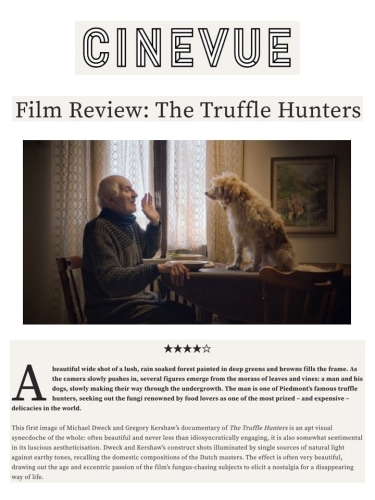Film Review: The Truffle Hunters
Cinevue
07/08/2021
Back
★★★★☆
By Christopher Machell
A beautiful wide shot of a lush, rain soaked forest painted in deep greens and browns fills the frame. As the camera slowly pushes in, several figures emerge from the morass of leaves and vines: a man and his dogs, slowly making their way through the undergrowth. The man is one of Piedmont’s famous truffle hunters, seeking out the fungi renowned by food lovers as one of the most prized – and expensive – delicacies in the world.
This first image of Michael Dweck and Gregory Kershaw’s documentary of The Truffle Hunters is an apt visual synecdoche of the whole: often beautiful and never less than idiosyncratically engaging, it is also somewhat sentimental in its luscious aestheticisation. Dweck and Kershaw’s construct shots illuminated by single sources of natural light against earthy tones, recalling the domestic compositions of the Dutch masters. The effect is often very beautiful, drawing out the age and eccentric passion of the film’s fungus-chasing subjects to elicit a nostalgia for a disappearing way of life.
This crafted sentimentality is self-consciously punctured with the directors’ dog-cam, attached to the collars of one of the hunters’ canine companions as he chaotically races through the forest, sniffing out the buried treasures. Aurelia, who lives alone with his beloved mutt, and 87-year-old Carlo, who sneaks out to hunt at night in defiance of his wife’s appeals to his safety embody the film’s bucolic appeal. This nostalgia is juxtaposed against the daily realities of the modern truffle economy, presented as a semi-lawless marketplace in which undercutting the competition goes hand in hand with tactics like poisoning your rivals’ dogs.
A cynical viewer might wonder if the time ever truly existed – regularly invoked by the old timers – when noble truffle hunters perpetually played fair, but there’s a knowingness to the film’s construction of an ideal past. Dweck and Kershaw frame conversations about intergenerational respect and shadowy deals done in darkened alleys as if its collection of strange characters are hardened criminals in a gangster film. The film simultaneously underlines its own artifice while inviting us to enjoy the delightful absurdity of a rarefied global culture based on the misadventures of eccentrics digging bits of fungus out of the ground.
Nevertheless, there is a wealth of real humanity underneath The Truffle Hunters‘ polished surface; in key moments, the film’s high aesthetics fade away to reveal unvarnished, understated pathos, such as in a sequence when one of the hunters reports the poisoning of one of his dogs to the police. Elsewhere, the sight of Carlo sneaking out of his window at night to hunt by owl calls in the forest offers hilarious insight into his passion of this strange life.